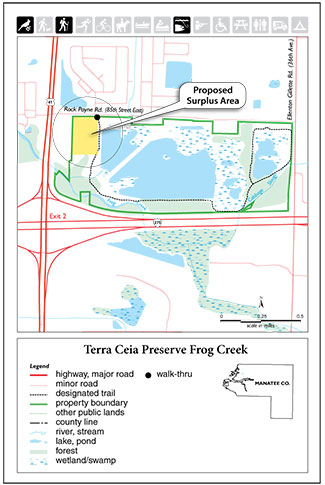
The District’s Governing Board recently approved the first parcel of land for surplus and the assessment process received glowing reviews.
Board members approved the surplus of a 6-acre portion of the Frog Creek tract in Manatee County. Staff determined the northwest corner of the tract has no significant conservation value. The District will retain the remaining portion of the 127 acres located near Interstate 275 and US 41. The property includes several areas formerly used as borrow pits that are planned for Surface Water Improvement and Management restoration projects to improve Frog Creek, which flows through the Terra Ceia Preserve State Park located at the mouth of Tampa Bay.
The objectives of the Surplus Lands Assessment project are to identify lands that no longer meet the original acquisition purpose, or do not provide water resource benefits, such as flood control, recharge, water storage, water management, conservation and protection of water resources, or preservation of wetlands, streams and lakes. For example, a landowner may have been unwilling to divide a property offered for sale, so the District purchased the entire parcel recognizing that some portions may have little conservation value. Those portions would be considered for surplus.
The surplus portion of Frog Creek sits in a high-traffic area, desirable for developers. The sale of this portion will allow the District to reinvest that money into lands with a greater conservation value.

The Governing Board appointed a Surplus Lands Subcommittee, made up of six Governing Board members, to provide guidance to staff and review future recommendations. Staff looks at a variety of criteria when identifying possible surplus lands.
The Surplus Lands Subcommittee reviews staff recommendations and then makes recommendations to the full Governing Board. The Governing Board makes the final decision. The process has been praised by the environmental community.
“I applaud the efforts of the District and this process should be the poster child for other districts,” said Charles Lee, director of advocacy at Audubon of Florida. “I’ve been involved in much of the process and they are using the right process and the right data to do it.”
Lee made his comments at the November Governing Board meeting where he praised the staff for being responsive to public input.
Next, staff anticipates bringing parcels near the Tampa Bypass Canal to the Governing Board for their surplus consideration in the next couple of months.
